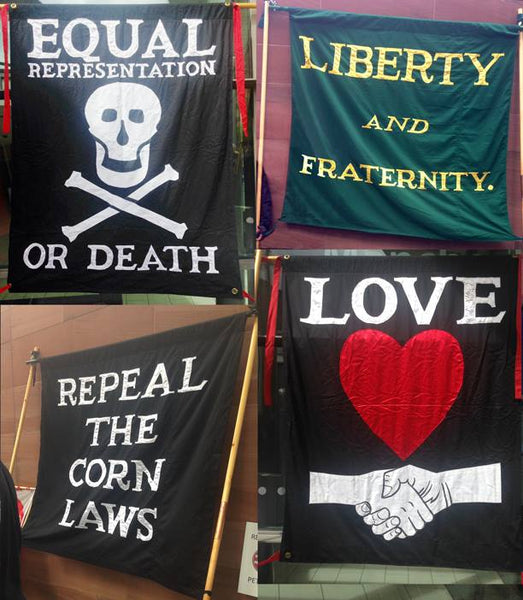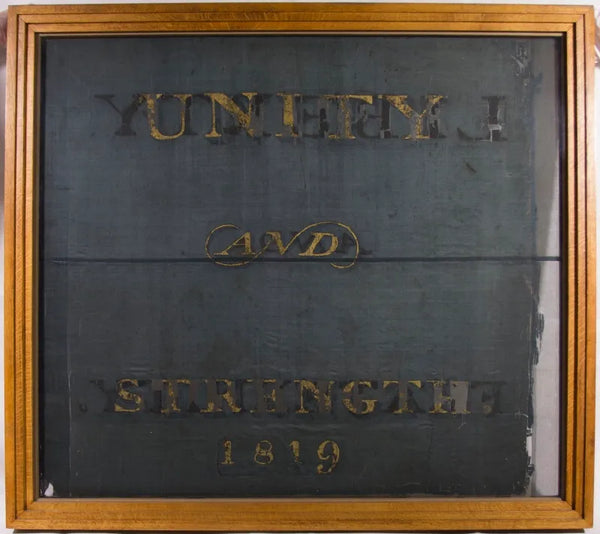
Getting the Details Right
Share
caption: Detail from engraving by Richard Carlile. All the poles from which banners are flying have Phrygian caps or liberty caps on top. Source: Manchester Library Services
One of the reasons I chose to write about the Manchester protest later called Peterloo in An Untitled Lady was that there were quite a few good sources on the event. Descriptions by reporters and private correspondents were published in national and local papers; the events led to court trials, which left documents and decisions; and even the people who gave out the donations collected from across the country to the injured kept close records.
But like all historical records, the accounts don’t quite agree. To write a single story, I had to make many choices, including deciding how many people I believed were hurt, who felled the first blow and when, and how many women really did attend the meeting. I often went by the “two or more” rule: If two sources agreed, and a third disagreed, I’d lean toward the first two. Of course, many details only appear once, so I made the best choice I could, always trying to keep my story coherent and logical within itself.
This all pleased the first editor who reviewed the manuscript back in 2012, so whew. But he did have one question, on one of the banners the marchers were carrying:
One of the banners, though, gives me pause. The one that reads “Unity and Strength, Liberty and Fraternity.” It’s the last two words that are the problem. The problem is, they’re French. =) The motto of the French revolutionaries—recent events, relative to this novel’s time period—was Liberte, Égalité, Fraternité ou le Mort. Or in English, “liberty, equality, fraternity, or death.” While these Mancunian reformers certainly seem to share the same sentiments, nevertheless, given the general English feeling towards the French at that time, I can’t believe they would echo the wording so closely. Easy fix, though; I could believe a “Liberty and Brotherhood” banner, just not “Liberty and Fraternity.”
That lodged a seed of doubt in my mind that started to grow. I went through my notes, and squinted at all the engravings, like the one above, to see what the banner had really said. I found one source – a consistently reliable one – that had “Liberty and Fraternity.” If I couldn’t find another, I wouldn’t have the necessary 2 for my rule.
I decided not to change it. Still, I worried that others might make that French revolution connection, and be taken out of the story. So I changed the sentence that followed it, making the idea not-French (or not-only French):
She was glad to march behind the banner that read Liberty and Fraternity. Brothers, sisters, and freedom. It seemed positively English, and increasingly possible, as judged from the center of thousands of marchers stepping lively on a bright-blue summer morning. Even the weather, dry if a shade warm, favored them.
Just last year, I found a Facebook group, the Peterloo Memorial Campaign, that carries news about the effort to create a better memorial to the event and also to plan for its bicentennial in 2019. Members posted photos from the 2014 memorial events, and there was the banner!

caption: Flags from Peterloo memorial 2014, photo by Catherine Booth
This one was obviously made after 1819, but when I asked the folks on the Facebook page, they said the original “Liberty and Fraternity” is the only surviving banner from Peterloo. It was carried by marchers from Middleton and is kept in Touchstones Gallery in Rochdale. I wish I’d been able to find that out sooner – I might’ve gone to see it on my research trip — but what a relief to have gotten it right anyway. Whew.
Here’s the back of the original flag; you can see the reversed L and Y of liberty on the side of Unity.

caption: Posted by Paul Fitzgerald on Peterloo Memorial Facebook page
If you are in the Manchester area Saturday 16 August, check out the Peterloo Picnic and other events. And maybe make plans to join in for the bicentennial, 16 August 2019.
